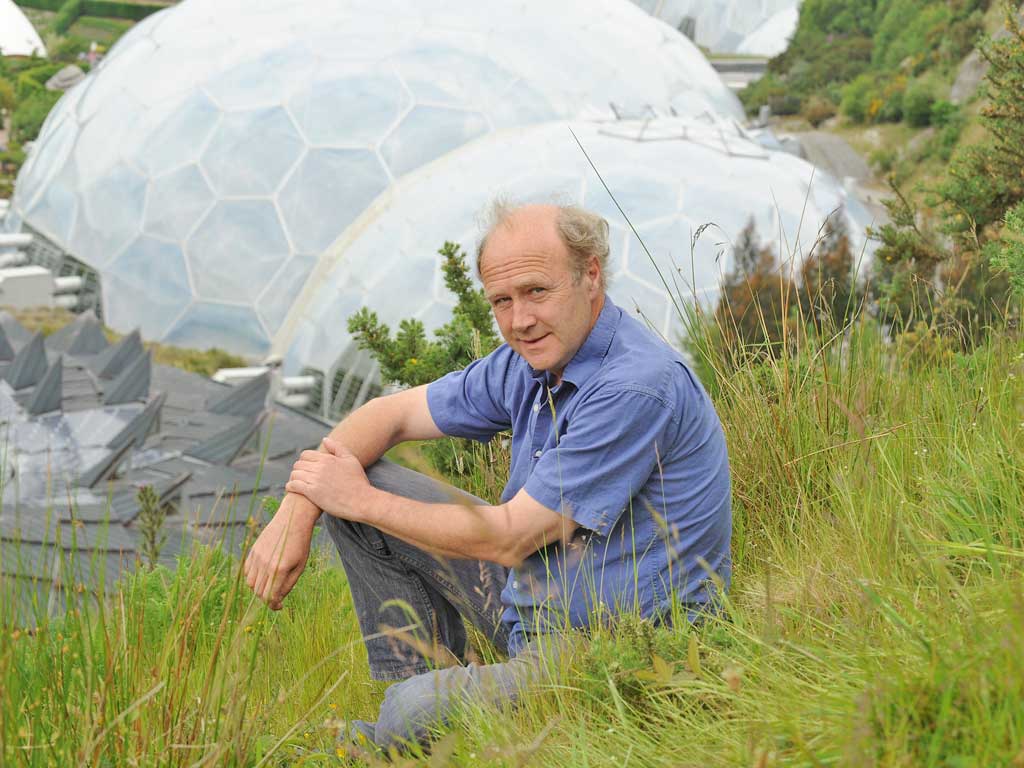Tim Smit: Life after Eden... Mr Optimism returns with a new big idea
Tim Smit, the maverick behind Cornwall's indoor rainforests, now has an even grander project: shaking up Britain's blue-collar workforce. Michael McCarthy meets him

The technical college, that old-fashioned institution for equipping school-leavers with practical skills, from plumbing to gardening, needs to be brought into the 21st century with a radical makeover, according to Tim Smit, the green entrepreneur who founded the Eden Project in Cornwall.
Mr Smit, whose two giant greenhouses showcasing the rainforest and other habitats have drawn nearly 14 million visitors since 2001, wants to revolutionise further education by setting up a learning centre for modern, sustainable and environmentally friendly construction technologies, delivered by new ways of teaching.
He wants to use all the resources of modern digital media to make learning easier for students, and to let them keep updating their skills after they have left, for life if necessary; furthermore, he wants to make the college's new-style lessons available all over the world via the internet. The institution, to be based at the Eden Project and opening next year, will be called HOW2; and Mr Smit bills it as "the world's first digital technical college".
The former rock music producer (who worked with Barry Manilow and the Nolan Sisters) came up with the idea after being a judge in a competition for low-carbon, environmentally-friendly building technologies, and being told that the projects he thought the best were impractical, because the construction industry in Britain didn't have the skills to implement them quickly.
"Then I heard an extraordinary thing," he says, "That the City and Guilds [the body awarding vocational qualifications] have got nearly 20 million alumni, but they don't have an alumni society – they don't have a professional development group.
"So all these people who have been through further education, who've become the plumbers, the whole range of installers, are now, unless they're very lucky or very driven, set in aspic. They're recommending the technologies they learnt on, which might have been years and years ago. There's no system of continuous upgrade."
Mr Smit wants HOW2, which is being set up at Eden in partnership with Cornwall College, the largest further education college in Britain, to be a centre where new construction technologies for a low-carbon world – insulation techniques, environmentally friendly materials, advanced heating systems – can not only be taught, they can be updated for students after they have left, through digital technologies such as mobile phone apps. "We can let people become members," he says. "A bit like an Open University for the technical world."
Students can be older people as well as school-leavers, and he wants the teaching to be radically different – for there to be, for example, three versions of any one lesson. "One might be theatrical, one might be simple pedagogy, one might even be in cartoon form." HOW2 will have a sound stage built in an integral feature, which will be used for recording lessons, which will later be available internationally via the web.
But Mr Smit, 57, has another reason for focusing on further education besides what he perceives as a skills gap. He says: "What if you redescribe what further educations is, so you give blue collar the same dignity as white collar?"
He feels strongly that practical skills are snobbishly perceived as inferior to white-collar occupations, "yet in truth, they shaped the industrial revolution". The students at HOW2, whose patron is to be Sir John Rose, former chief executive of Rolls-Royce, will be taught the foundation knowledge behind their subjects, so they are more than "a generation of installers", but they will recapture "the spirit of invention, design and problem solving".
He says: "We want HOW2 to be an inspiration, a brand if you like, to make people realise that blue collar, making things, is not anything other than totally dignified and noble."
The college is just the latest idea to sprout from the fertile Smit brain. Recently he dreamed up The Big Lunch, the annual get-together where people can get to know their neighbours – yesterday he hosted the Jubilee Big Lunch in London's Piccadilly. Another idea in the pipeline is to power Eden by geothermal heating – sinking deep pipes to pick up the Earth's natural heat.
They all spring, really, from his optimism and his belief in people's ability to solve problems. He doesn't share the view that the future of the planet is bleak. "I am fantastically optimistic," he says. And he grins his optimistic grin.
Green genius: a life in brief
1990 Rediscovers the forgotten Edwardian estate, the Lost Gardens of Heligan, in Cornwall and restores them to their former glory.
2001 The Eden Project, which Smit founded, opens to the public. Site comprises two vast greenhouses reproducing the rainforest and other ecosystems inside a Cornish clay pit.
2009 Founds The Big Lunch, an annual get-together with neighbours now being celebrated all over Britain.
2012 Founds HOW2, "the world's first digital technical college", in association with Cornwall College.
Join our commenting forum
Join thought-provoking conversations, follow other Independent readers and see their replies
Comments
Bookmark popover
Removed from bookmarks